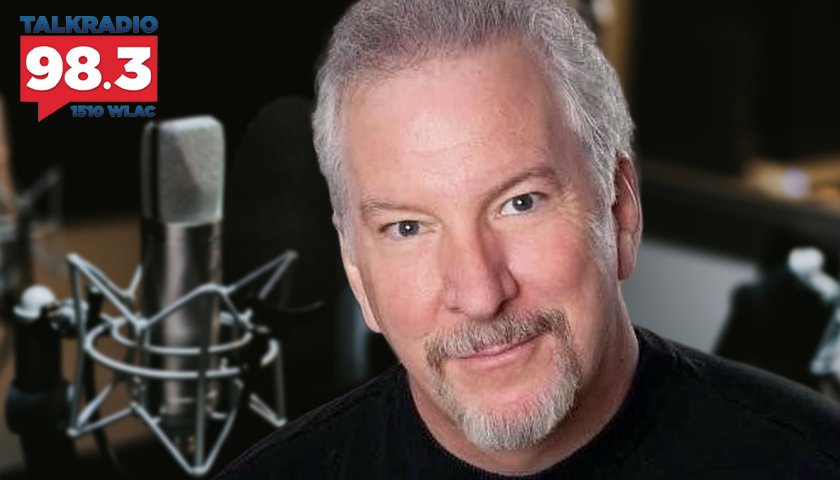Live from Music Row Monday morning on The Tennessee Star Report with Michael Patrick Leahy – broadcast on Nashville’s Talk Radio 98.3 and 1510 WLAC weekdays from 5:00 a.m. to 8:00 a.m. – host Leahy welcomed the original all-star panelist, Crom Carmichael, in studio to remember the talent and American can-do spirit of Nashville’s conservative talk radio host, Phil Valentine.
Leahy: We are joined in studio by the original all-star panelist, Crom Carmichael. Crom, you’ve been on radio here in Nashville in one form or another as a panelist since what, 1980s?
Carmichael: I went through a large gap where I wasn’t, but 1984 would have been my first appearance on the Teddy Bart Show. Now we lost Phil Valentine.
Leahy: Yes.
Carmichael: On Saturday.
Leahy: Very sad. Phil, I think, began his career in talk radio here on 95 WLAC.
Carmichael: I don’t know when it started, but Phil was one of the great fighters against the state income tax when Governor Don Sundquist, after having pledged to die before allowing state income tax 60 days later, then completely flipped.
And when I say that, Sundquist said that in a campaign event right before being reelected. And at the time he said it, Sundquist was ahead in the polls 70-30. So he had no reason to say that if he didn’t mean it. And then 60 days later, at the State of the State Address in January, he said the state finances were in shambles and we must have a state income tax.
And Phil Valentine, he’s the one who led the horn honkers who drove around the state capitol. He broadcast from a tent outside of the state capitol. He was a very, very genuine person, just genuine.
Leahy: A great guy, a very great guy, and a great sense of humor as well.
Carmichael: Oh yeah.
Leahy: He had some great phrases.
Carmichael: He did. And he and Johnny B, when they had become an institution in talk radio in Nashville.
Leahy: And he was on another station here from three to seven. But I think he spent a couple of years in Philadelphia, came back here. He’s been back here, I think, for well over a decade.
Carmichael: Oh, yeah.
Leahy: Probably longer than that.
Carmichael: He’s been on the radio here since ’95. 25 years.
Leahy: With the exception of a couple of years. Johnny B, of course, is a great sidekick. And Johnny B, I think, is just devastated by the loss. As is Susan, who is a wonderful person, his wife. And he has a couple of young sons.
I think they’re just in college or just out of college or in college age. So a devastating loss to Middle Tennessee. Everybody knew that Phil was the number one conservative talk radio host in Nashville. Everybody knew it.
Carmichael: Oh, yeah.
Leahy: And yet when I would meet him, it was just like a couple of colleagues talking. And he was humble. He was not at all a guy who would sort of say, well, I’m the big guy in town. He was very gracious, always gracious, always fun.
Carmichael: Talk radio is a venue where the host of the show is no more successful than the host’s ability to be interesting and entertaining to their audience. That does require a certain amount of humility. It really does.
Whereas I’m going to compare that to if you are the anchor on a news broadcast, that news broadcast was there before you were. You didn’t build that audience. It just was there.
The question is whether or not you can maintain the audience. I saw a very interesting story over the weekend as we’re talking about this. It was one of the producers. This was on Cheryl Atkinson.
Leahy: She’s great
Carmichael: In her case, her show really is dependent on her content. But she did a show and she interviewed one of the longtime producers of 60 Minutes. And he said that Mike Wallace was an absolute disaster as a person to work for.
Said he was just nasty screamed at you. Profanities and verbally assaulted all of their producers. In fact, after listening to him talk, he said that at one point, Ed Bradley went 15 years where he wouldn’t speak to him – the producer – because Ed Bradley thought that the producer had helped Mike Wallace steal a story from Ed Bradley.
And so what you have is – 60 Minutes was an institution that lasted and still lasts well beyond the personalities. But Phil Valentine’s show is now gone because Phil Valentine is gone.
Leahy: And I do the morning show and we bring news. And mostly we’re news. Usually, I say if I’m funny, it’s by accident, but I am occasionally funny, but mostly it’s by accident. Phil was naturally funny. Naturally funny.
Carmichael: He and Johnny B had a chemistry that on radio – to me, was similar to Ed McMahon and Johnny Carson.
Leahy: Yes. And Phil, although a strong conservative, was also extremely entertaining. He came up with this thing, who’s dancing in the booth on Friday.
Carmichael: Dancing in the booth. (Laughter) And that was always.
Leahy: It was a great fun little act.
Carmichael: It was a great way to highlight somebody who had done something particularly strange during that week.
Leahy: Well, I’m not sure, but my recollection is the first person to be dancing in the booth was former Governor Don Sundquist when he came out and flipped on the state income tax. That’s my recollection. I could be wrong.
Carmichael: Then that’s a 25-year part of the Phil Valentine Show.
Leahy: Everybody would look forward to who’s dancing in the booth on Friday. (Laughs) Right? Then he would elaborate on how they were dancing.
Carmichael: He and Johnny B. Oooh, a backflip (Laughter) It was always great.
Leahy: The other phrases that trademark Phil Valentine phrases. Uncomfortable.
Carmichael: Yes.
Leahy: Remember that? Bovine cetology.
Carmichael: Bovine cetology.
Leahy: That was another phrase. But, of course, whenever he poked fun at political correctness, he would say, we don’t want to make you feel uncomfortable. And then he would pause for dramatic effect. And then everybody knew what was coming.
People would be driving in their cars. And he would say, we don’t want you to be … And he’d pause. Everybody driving, listening to him in the afternoon would say, along with him uncomfortable.
Carmichael: Well, the medium of talk radio is one-dimensional. It’s sound. Whereas television is visual. Whereas the written word is visual. And so Phil understood how to use the single dimension of talk radio and do it in a very interesting and very entertaining way.
Leahy: He did. And it was the entertaining factor. People listened to him because he was a friend. He talked about local things. For instance, remember when he had this Mercedes Benz and he wanted to do the biodiesel thing and he went through this whole process.
One thing I say about Phil, he was a can-do kind of guy. In other words, he had the radio show. But if you wanted to get something done, he would just figure out, well, how am I going to do this?
A classic sort of American can-do attitude, which is, I think, another thing that endeared him to people. Remember, he wanted to run his Mercedes Benz Diesel on biofuel that he created.
And he went through this whole elaborate process of how he did it. And he did it! And he ran it on Biofuel but ended up after a couple of years saying, you know, I can do it, but it’s an awful lot of work. (Laughter) No worth it! Another example of Phil being creative and having a can-do attitude. So there he was.
He saw Al Gore, who came right after he lost the presidential election in 2000. He became Mr. Climate guru. And so he put this documentary together called An Inconvenient Truth. That was the Al Gore thing. And remember, we were all going to be gone in ten years or something like that.
Carmichael: We’ve already been gone.
Leahy: We’ve been gone, we’re gone. And Phil, it just rankled him. And he said, well, I’m going to do something about that. And literally from scratch, he put together a documentary film back in 2012 called An Inconsistent Truth which kind of poked holes in every argument made by Al Gore. It’s a great documentary. I don’t know if you’ve seen it, but it’s really a great documentary.
Carmichael: I have not seen it, but I’ve heard other people who have seen it. And then Phil just went right down all of the things that turned out to be false in An Inconvenient Truth.
And some of the things that turned out to be false were false at the time of the production of An Inconvenient Truth. But ten years later, there are many predictions of what would happen that turned out to be false.
Leahy: All false.
Carmichael: In fact, the whole An Inconvenient Truth turned out to be fundamentally false.
Leahy: Fundamentally false. An Inconsistent Truth, Phil’s 2012 documentary pointed out. I’ll tell you, Phil had a great sense of timing and a great sense of phrase-making.
You remember one phrase that he had that was really so good, because sometimes listeners would call in and they’d be a little bit, shall we say, off point? And he would call them van Gogh listeners.
Remember that a van Gogh listener was a listener who listened with just one ear. (Laughter) That was a Phil Valentine phrase.
Carmichael: That’s a good one. That’s a good one. Well, he will be missed. He was a genuinely nice fellow and smart.
Leahy: I want to talk about legacy and his legacy. Really, if you think about it Crom, what would you say is the number one driving force of economic growth in the state of Tennessee today and really, for the past 20 years? I would say it’s the lack of a state income tax.
Carmichael: Not just a lack of a state income tax, but we’ve also gotten rid of the estate tax. And we are now rid of the hall tax, which was a tax on interest and dividends, which makes Tennessee a very attractive place for entrepreneurs.
And entrepreneurs attract capital, and entrepreneurs create businesses that create jobs. And so Phil, the fact that – and I would say he led the fight.
Leahy: I would say Phil led the fight. There were other talk radio hosts there as well, but I think Phil led it. And frankly, had he not led the fight, yeah, we would have a state income tax today.
Carmichael: We very well could.
Leahy: That is a huge legacy and attribute to Phil Valentine.
Carmichael: And then Nashville would be growing like Louisville, which isn’t very much at all.
– – –
Tune in weekdays from 5:00 – 8:00 a.m. to the Tennessee Star Report with Michael Patrick Leahy on Talk Radio 98.3 FM WLAC 1510. Listen online at iHeart Radio.
Photo “Phil Valentine” by Tennessee Republican Party.






One important part of brother Phil’s legacy missing from this discussion was his ability to dig his heals in and not budge from any position. And this my friends is what ultimately lead to his untimely death.
Certain positions have can’t move on, like abortion. But damnit people, don’t let politics rule over every little decision you make. There’s enough data out now to make common sense decisions for yourself and your family. If you’re at risk, get vaccinated!